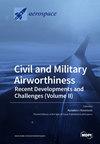Aerodynamic Uncertainty Quantification of a Low-Pressure Turbine Cascade by an Adaptive Gaussian Process
IF 2.1
3区 工程技术
Q2 ENGINEERING, AEROSPACE
引用次数: 0
Abstract
Stochastic variations of the operation conditions and the resultant variations of the aerodynamic performance in Low-Pressure Turbine (LPT) can often be found. This paper studies the aerodynamic performance impact of the uncertain variations of flow parameters, including inlet total pressure, inlet flow angle, and turbulence intensity for an LPT cascade. Flow simulations by solving the Reynolds-averaged Navier–Stokes equations, the SST turbulence model, and γ−Re˜θt transition model equations are first carried out. Then, a Gaussian process (GP) based on an adaptive sampling technique is introduced. The accuracy of adaptive GP (ADGP) is proven to be high through a function experiment. Using ADGP, the uncertainty propagation models between the performance parameters, including total pressure-loss coefficient, outlet flow angle, Zweifel number, and the uncertain inlet flow parameters, are established. Finally, using the propagation models, uncertainty quantifications of the performance changes are conducted. The results demonstrate that the total pressure-loss coefficient and Zweifel number are sensitive to uncertainties, while the outlet flow angle is almost insensitive. Statistical analysis of the flow field by direct Monte Carlo simulation (MCS) shows that flow transition on the suction side and viscous shear stress are rather sensitive to uncertainties. Moreover, Sobol sensitivity analysis is carried out to specify the influence of each uncertainty on the performance changes in the turbine cascade.利用自适应高斯过程量化低压涡轮级联的空气动力不确定性
低压涡轮机(LPT)的运行条件经常会出现随机变化,从而导致气动性能的变化。本文研究了低压涡轮机级联的入口总压、入口流角和湍流强度等流动参数的不确定变化对气动性能的影响。首先通过求解雷诺平均纳维-斯托克斯方程、SST 湍流模型和 γ-Re˜θt 过渡模型方程进行流动模拟。然后,引入了基于自适应采样技术的高斯过程(GP)。通过函数实验证明了自适应 GP(ADGP)的高精度。利用 ADGP,建立了包括总压力损失系数、出口流角、茨魏费尔数在内的性能参数与不确定入口流量参数之间的不确定性传播模型。最后,利用传播模型对性能变化进行了不确定性量化。结果表明,总压力损失系数和 Zweifel 数对不确定性很敏感,而出口流角几乎不敏感。通过直接蒙特卡罗模拟(MCS)对流场进行的统计分析显示,吸入侧的流动转变和粘性剪切应力对不确定性相当敏感。此外,还进行了 Sobol 敏感性分析,以明确每种不确定性对水轮机级联性能变化的影响。
本文章由计算机程序翻译,如有差异,请以英文原文为准。
求助全文
约1分钟内获得全文
求助全文
来源期刊

Aerospace
ENGINEERING, AEROSPACE-
CiteScore
3.40
自引率
23.10%
发文量
661
审稿时长
6 weeks
期刊介绍:
Aerospace is a multidisciplinary science inviting submissions on, but not limited to, the following subject areas: aerodynamics computational fluid dynamics fluid-structure interaction flight mechanics plasmas research instrumentation test facilities environment material science structural analysis thermophysics and heat transfer thermal-structure interaction aeroacoustics optics electromagnetism and radar propulsion power generation and conversion fuels and propellants combustion multidisciplinary design optimization software engineering data analysis signal and image processing artificial intelligence aerospace vehicles'' operation, control and maintenance risk and reliability human factors human-automation interaction airline operations and management air traffic management airport design meteorology space exploration multi-physics interaction.
 求助内容:
求助内容: 应助结果提醒方式:
应助结果提醒方式:


